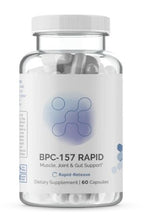BPC-157, A Novel Peptide
There is a lot of interest these days in peptide therapy, and for good reason. Peptides are chains of amino acids (protein building blocks), and occur naturally in the body as signalers for a variety of bodily functions. Insulin is a peptide, as is thyroid hormone, growth hormone (HGH) and a variety of enzymes throughout the body. Despite their widespread occurrence and variety of functions, there is little clinical research supporting their use in medicine. However, there is a growing body of animal and laboratory research that supports the power of these substances.
One peptide that has my attention has the prosaic name of BPC-157. BPC stands for Body Protection Compound, a protein which was first discovered in gastric (stomach) juices in 1993. It was named Body Protection Compound (sometimes called Bepecin), because it was found to protect the stomach lining against ulceration. One component of BPC, containing a chain of 15 amino acids, is called BPC-157 and has been the recipient of most of the excitement.
While BPC-157 originally was found to protect the mucous membrane lining of the stomach, much of the excitement is due to its apparent ability to improve healing of musculoskeletal injuries. Again, these are not human clinical studies, but there are a number of animal studies (mostly on rats) that support this finding. In 2019, a comprehensive review https://link.springer.com/article/10.1007/s00441-019-03016-8#Sec2 was published detailing the research into BPC-157. Studies were described detailing the uses of this peptide in tendon and ligament injuries, as well as problems of skeletal muscle and even bone. For instance, one study looking at tendon-to-bone injury found that adding BPC-157 improved healing despite the use of corticosteroids, which are known to slow down healing. The author states that “BPC 157 has the apparent ability to counteract corticosteroid aggravation.” Other studies found BPC-157 to improve all 3 phases of the healing process (inflammation, repair or proliferative, and remodeling).
BPC-157 also appears to be neuroprotective, that is, it protects the brain from damage, and promotes healing when injured. This includes traumatic brain injury, as a study of brain-injured mice showed. There was significant improvement in both survival, and post-trauma residual effects in the BPC-157 treated group as opposed to the placebo group. The peptide has also been found to be neuroprotective in a variety of neurological illnesses, including rat models of Parkinson’s and Alzheimer’s Diseases.
The digestive system is another area that BPC-157 seems to help, and there is evidence that diseases such as ulcerative colitis, Crohn’s Disease, and gastritis caused by NSAIDs can benefit from the peptide, as well as stomach ulcers (remember, BPC-157 was discovered in stomach juice.) It has been suggested with some evidence that BPC-157 can block the toxicity of different drugs, including NSAIDs and even methamphetamine.
The effects on NSAIDs are particularly noteworthy since BPC-157 is known to be anti-inflammatory, and thus could theoretically take the place of NSAIDs completely. The list of possible uses is much longer, but many of the recommendations await good clinical studies to support its use.
BPC-157 comes in many forms including injectable (IM or subcutaneously), capsules or pills and even a topical (cream) form. The injectable forms, of course, are prescription only, but the oral and cream forms are over the counter. Studies so far show that in normal doses it’s totally nontoxic. In our office, we’re still discovering uses of it, particularly in musculoskeletal problems. So far, we’ve been pleased with the results.

